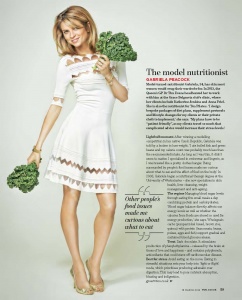READ THE ARTICLE:
(From You magazine, March ’14)
Model-turned-nutritionist Gabriela, 34, has skin most women would swap their wardrobe for. In 2013, the Queen’s GP Dr Tim Evans headhunted her to work with him at the Grace Belgravia club’s clinic, where her clients include Katherine Jenkins and Anna Friel. She is also the nutritionist for Ten Pilates. ‘I design bespoke packages of diet plans, supplement protocols and lifestyle changes for my clients or their private chefs to implement,’ she says. ‘My plans have to be “patient friendly”, as my clients travel so much that complicated advice would increase their stress levels.
Lightbulb moment:
After winning a modelling competition in her native Czech Republic, Gabriela was told by a booker to lose weight. ‘I ate boiled fish and green beans and my calorie count was probably much less than the recommended intake. As long as I was thin, it didn’t seem to matter. I specialised in swimwear and lingerie, so I was treated like a pretty clothes hanger. Being surrounded by people’s food issues made me curious about what to eat and the effect of food on the body.’ In 2008, Gabriela began a nutritional therapy degree at the University of Westminster – she now specialises in skin health, liver cleansing, weight management and anti-ageing.
The Regime:
Managing blood sugar levels through eating five small meals a day combining protein and carbohydrates. ‘Blood sugar balance directly a ! ects our energy levels as well as whether the calories from foods are stored or used for energy production,’ she says. Wholegrain carbs (pumpernickel bread, brown rice, quinoa) with protein (lean meats, beans, pulses, eggs and fish) support gradual and sustained blood glucose release.
Treat:
Dark chocolate. It stimulates production of phenylethylamine – released by the brain at times of love and happiness – and contains polyphenols, antioxidants that could stave off cardiovascular disease.
Best for stress:
Avoid eating on the move. Eating in stressful situations sets your body into ‘fight or flight’ mode, which prioritises producing adrenalin over digestion. This may lead to poor nutrient absorption, bloating and indigestion.


